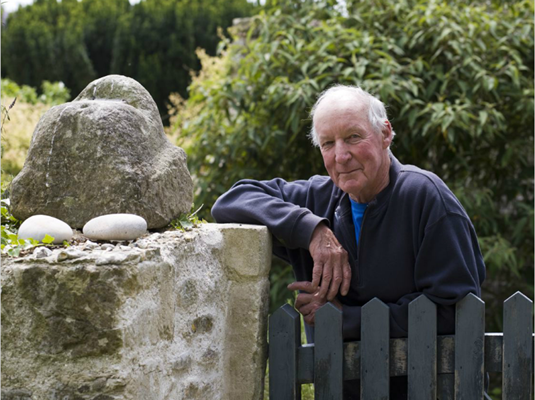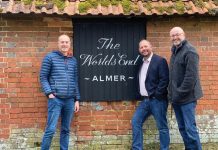At an uplifting event at Roche Court outside Salisbury, to remember and celebrate the life of the artist, John Hubbard, the British Art Historian, Neil MacGregor highlighted John’s combination of ‘voracious, sensational curiosity’, his ‘endless intellectual energy’ and his ‘unshakeable calm.’ It was a fitting description of a man whose engaging character and artistic legacy has left an indelible mark on the history of contemporary art.
John Hubbard not only touched many lives with his expansive paintings and drawings, but his warmth and generosity both inspired and heartened so much of the lives of those who were fortunate enough to have known him. Most recently he was patron of the Marshwood Arts Awards, but in the past, as Neil MacGregor also pointed out, John had given generously of his time to South West Arts, Tate St Ives and many other public institutions, as well as donating work to the British Museum and numerous collections all over the world.
Born in Connecticut in 1931, John was educated at Harvard University before completing his military service based in Japan. After studying at Art Students League, New York City and with Hans Hoffman, he then travelled throughout Europe in a Deux Chevaux, eventually ending up in London where he met his wife Caryl whilst looking for galleries in which to show his work. He and Caryl settled near Bridport and from there John’s career found him painting in locations as diverse as Malaysia and Morocco, Indiana and the Scilly Isles. He won the Jerwood Prize in 1996 and has work in collections from Cornwall to Melbourne, Australia.
In an interview in this magazine in 2004, John told Katherine Locke that art is like telling a story. ‘It has lots of changes of plot and pace’ he said. ‘The work evolves before you—there are good bits and not so good—some happy parts and some sadness. There is backtracking and interweaving—just like a good novel.’ He also knew that the novel of an artist’s life must come from somewhere very close. In a short film made for an exhibition of his work in Washington DC in 2013 he said: ‘You have to base your work on what you love and what excites you, what draws you out, what inspires you, and what continues to grow inside you.’
Thanks to the work of John’s wife Caryl and his children Kate and Edmund, we now have an opportunity to enjoy a close-up view of how John Hubbard’s work evolved, how the novel of his painting life grew. A new book, first begun by John in the year before he died and lovingly finished by his family, has been published by Unicorn Press.
John Hubbard – Remaking Landscapes offers a fascinating insight into how the artist developed his work and presents a selected timeline of his paintings and drawings from 1958 to 2010. From the majestic mountains and luminous light of mainland Greece, to the splendour of late sun striking a wave in Cornwall, John’s intense engagement with a contained stretch of landscape often led to him being described as a landscape painter. But those that know his work also know of another level to the world around him that John Hubbard strove to portray—a world that, like Narnia from a wardrobe, could only be found within his vision and then his canvas.
There is a quote from Walt Whitman that John liked to read which says much about what he as a gregarious and warm person and as an artist driven to see beyond what was in front of him, sought to find in his life: “Maybe the things I perceive—the animals, plants, men, hills shining and flowing waters, the skies at night, colours, densities, forms—maybe these are only apparitions, and the real something has yet to be known.”
Although Whitman was in no doubt that what surrounds us are just apparitions, John Hubbard never stopped looking for ways to portray his own perception of the world around him. It was something much more than an ethereal vision.
In a long and productive life, he met and got to know a wide circle of other artists and creative people and the book includes notes from his diaries that make fascinating reading. The last word on Remaking Landscapes quite rightly belongs to him. Pointing out that a good deal had been written about his work in reviews, prefaces to exhibition catalogues and journalism he said: ‘I regard this book as an opportunity to interpret various events in my life in my own way; its purpose being to build a sense of intimacy which also has a flexible, entertaining structure. If it provides a brief facsimile profile of my painting and drawing, it will stand as a retrospective exhibition in itself.’
John Hubbard – Remaking Landscapes
is published by Unicorn Press
on April 26th 2018.
The book includes a forward
by Hilary Spurling and an article
The Garden at Chilcombe by Sarah Raven
ISBN: 978-1-910787-83-0. RRP £30.










